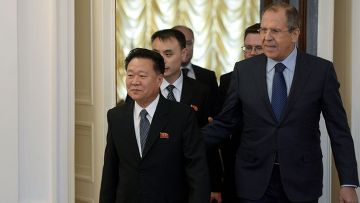
North Korea’s special envoy to Russia has returned home after appearing to make significant progress in improving bilateral ties, suggesting that North Korean leader Kim Jong Un may visit Moscow for a summit, ahead of its longtime ally China.
Beijing, with its relations with Pyongyang deteriorating in recent years, is anxiously watching the developments between North Korea and Russia from the sidelines.
Choe Ryong Hae, secretary of the Workers’ Party of Korea, returned to North Korea on Nov. 24 after an eight-day visit, which included meetings with Russian President Vladimir Putin and Foreign Minister Sergei Lavrov.
A North Korean news organization characterized the talks between Choe and Putin on Nov. 18 as conducted in a “warm and friendly atmosphere.”
It quoted Putin as saying, “It is important to pursue a way that will further advance mutually beneficial cooperation of the two nations.”
In response, Choe reportedly said: “Looking ahead to next year, we are determined to expand and develop the two countries’ friendly and cooperative relationship to a higher level.”
After the meeting with Choe on Nov. 20, Lavrov referred to a possible summit between Kim and Putin during a news conference, saying that they are ready for contact between the two leaders.
South Korean experts on North Korean affairs said the recent development raised the possibility that Kim may visit Russia, ahead of China, to meet with the Russian president.
Against the backdrop of Pyongyang’s sudden courtship of Moscow is North Korea’s attempt to find an ally after its relationship with China, a major aid provider over the years, has soured. The reclusive country proceeded with its third nuclear test in 2013 despite Beijing’s strenuous opposition.
In July this year, Chinese President Xi Jinping visited South Korea, ahead of North Korea, a gesture that was widely viewed as unusual.
Xi’s visit angered the North Korean side, pushing it further toward the Russian camp.
“The leadership in Pyongyang is striving to cut the nation’s political and economic dependence on China,” said a source familiar with North Korean affairs. “In this respect, the most reliable partner is Russia.”
Russia, in turn, has shown diplomatic considerations for North Korea.
Moscow opposed a resolution condemning the North Korean government for human rights abuses adopted at the U.N. General Assembly’s Third Committee on Nov. 18.
Explaining Russia’s opposition, Lavrov said that a U.N. organization should not become a judicial and prosecuting body.
The support was apparently meant, in part, to return a favor to Pyongyang for opposing a U.N. General Assembly resolution in March that called on states not to recognize the Russian annexation of Crimea.
With North Korea making entreaties toward Russia, China remains cautious.
According to Lavrov, Choe told him that North Korea is ready to return to the negotiating table for six-party talks on Pyongyang’s nuclear development program without any preconditions.
Although China, the chair of the six-party talks, welcomes Pyongyang’s willingness to have a dialogue with relevant nations, it is watching closely the real intentions of North Korea in approaching both Russia and Japan behind its back. Earlier this year, North Korea agreed to reinvestigate the abduction of Japanese in the 1970s and 1980s, and recently invited Japanese officials to Pyongyang to give them an update.
Zhang Liangui, professor of international strategic research at the Chinese Communist Party’s Institute for International Strategic Studies, said China should determine exactly what North Korea is seeking.
“It will mark a major policy shift if North Korea intends to return to the negotiating table to begin efforts to denuclearize the nation,” Zhang said. “But if its real purpose is to secure economic aid, we cannot readily go along with the scheme.”
(This article was written by Akihiko Kaise in Seoul, Akiyoshi Komaki in Moscow and Nozomu Hayashi in Beijing.)
THE ASAHI SHIMBUN http://ajw.asahi.com/article/asia/korean_peninsula/AJ201411260057

 December 1, 2014
December 1, 2014  Опубликовано в
Опубликовано в